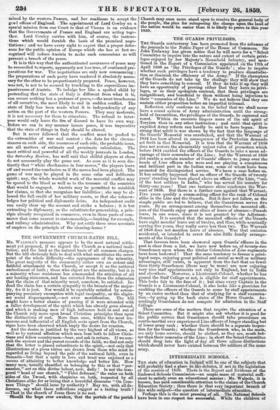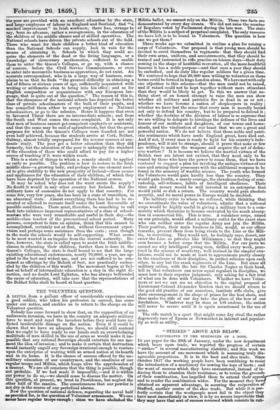INTERMEDIATE SCHOOLS. - Tux state of education in Ireland will
be one of the subjects that will probably find a place in the debates, if not in the legislation of the session of 1859. There is the Report and Evidence of the Endowed Schools Commission—an ample mass of material suffi- cient to satisfy even an educational maniac ; Mr. Walpole, it is known, has paid considerable attention to the claims of the Church Education Society ; then there is that very important branch of this wide subject—the question of intermediate education.
Perhaps this is the most pressing of all. The National Schools have been in one respect too sueoessful. While the children of
the poor are provided with an excellent education by the state, and large employers of labour in England and Scotland, find "a marked improvement" in Irish workmen, there has, strange to say, been no advance, rather a resrogression, in the education of the children of the middle classes and of skilled operatives. The National schools have driven the private schools out of the field. Those who want for their children a better kind of education than the National Schools can supply, look in vain for the means of obtaining it. Schools in which they could ac- quire the elements of the dead or the living languages, or a knowledge of elementary mathematics, sufficient to enable them to enter the Queen's Colleges, or go up, with a chance of success, before the Civil Service Commissioners, or even to enter into mercantile business as apprentices, do not exist. An accurate correspondent, who is in a large way of business, com- plains to us that he finds "the greatest difficulty in obtaining a lad of fifteen or sixteen years of age, sufficiently acquainted with writing or arithmetic even to bring into his office ; and as for English composition or acquaintance with any European lan- guage, that is quite out of the question." The reason of this is, that the cheapness of the national schools has deprived the better class of private schoolmasters of the bulk of their pupils, and has compelled them either to accept employment as National schoolmasters, or go to the colonies. Hence it happens that even in favoured Ulster there are no intermediate schools ; and from the South and West comes the same complaint. It is not only that men of business cannot get competent employes or assistants, and that the same may be said of agriculturists, but that the great purposes for which the Queen's Colleges were founded are not even half achieved, because the students arrive at Cork, Belfast, Galway, almost totally unprepared for the severer courses of aca- demic study. The poor get a better education than they did formerly, but the education of the poor is unhappily the standard of the education of those who could afford to pay for a higher course of teaching if it were within reach. This is a state of things to which a remedy should be applied as early as possible. The problem is how to restore to the Irish middle class—a growing body, and perhaps the one element need- ed to give stability to the new prosperity of Ireland—those means and appliances for the education of their children, of which they have been deprived by the operation of the National system. It may be asked why does not the want create the supply ? No doubt it would in any other country but Ireland. But the ordinary laws of economics do not apply to that country. For some few, very few years, she has been in a state of transition, in an abnormal state. Almost everything there has had to be re- created or allowed to recreate itself under the least favourable of possible conditions. There must, therefore, be something to call back into existence improved representatives of a class of school- masters who were very remarkable and useful in their day—the middle-class teacher of the pm-national school period. Many persons, competent to form an opinion, think that this cannot be accomplished, certainly not at first, without Government super- vision and perhaps some assistance from the state ; even though in the main the schools would be self-supporting. What seems to be most wanted is an impulse from the central authority. Be- fore, however, the state is called upon to assist the Irish middle- classes in educating their children, further than is done in the Queen's Colleges, the state is itself bound to see that the large exisiting educational endowments, nearly 70,000/. a year, are ap- plied to the best and widest use, and are not suffered to be con- sumed as offerings by the Moloch of Sect, nor practically embez- zled by the children of this world. The movement begun at Bel- fast on behalf of intermediate education is a step in the right di- rection, and no doubt Lord Eglinton, who has always befriended the cause of education, will take care that the representations of the Belfast folks shall be heard at head quarters.



































 Previous page
Previous page